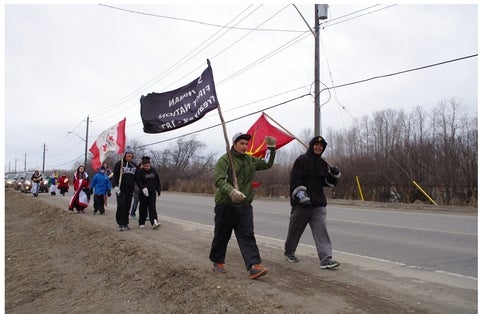Trick or Treaty?
Film by: Alanis Obomsawin
2014, Runtime of 1 hour and 24 minutes
Film provided courtesy of the National Film Board of Canada (NFB)
About the event
We are excited to share a free, virtual community screening of the acclaimed film, Trick or Treaty, directed by Alanis Obomsawin followed by a discussion with Robin Stadelbauer, Indigenous Relations Coordinator and Professor Susan Roy.
This is open to all members of our Waterloo campus community and beyond. There are two ways you can participate in this event:
- Register, and choose to receive a link to watch the film at a time that is convenient for you. Then, on November 3, at 7:15pm, join us for a virtual discussion of the film. When you register, you will receive a link via email to watch the film. Closer to November 3, we will then send you a second link, which you can use to join in the discussion about the film.
- Register, and choose to receive a link to join the virtual community screening and post-screening discussion that will take place on November 3. The screening will begin at 5:30pm and run until 7pm, with a short break before the discussion begins at 7:15pm.

Trick or Treaty? Directed by Alanis Obomsawin Produced by Annette Clarke, Alanas Obomsawin Young Protestors from Idle No More 2014 National Film Board of Canada - All rights reserved
About the film
Covering a vast swath of northern Ontario, Treaty No. 9 reflects the often contradictory interpretations of treaties between First Nations and the Crown. To the Canadian government, this treaty represents a surrendering of Indigenous sovereignty, while the descendants of the Cree signatories contend its original purpose to share the land and its resources has been misunderstood and not upheld. Enlightening as it is entertaining, Trick or Treaty? succinctly and powerfully portrays one community’s attempts to enforce their treaty rights and protect their lands, while also revealing the complexities of contemporary treaty agreements. Trick or Treaty? made history as the first film by an Indigenous filmmaker to be part of the Masters section at TIFF when it screened there in 2014.
About the director, Alanis Obomsawin
One of the most acclaimed Indigenous directors in the world, Alanis Obomsawin came to cinema from performance and storytelling. Hired by the NFB as a consultant in 1967, she has created an extraordinary body of work—50 films and counting—including landmark documentaries like Incident at Restigouche (1984) and Kanehsatake: 270 Years of Resistance (1993). The Abenaki director has received numerous international honours and her work was showcased in a 2008 retrospective at New York’s Museum of Modern Art. “My main interest all my life has been education,” says Obomsawin, “because that’s where you develop yourself, where you learn to hate, or to love.”
Additional resources to learn more about Alanis Obomsawin:
- National Film Board Blog, Where the Sun Also Rises: The Films of Alanis Obomsawin
- Alanis Obomsawin’s full body of work is now available online through the National Film Board website
- In a recent CBC Q episode, Alanis Obomsawin reflects on her life and accomplishments